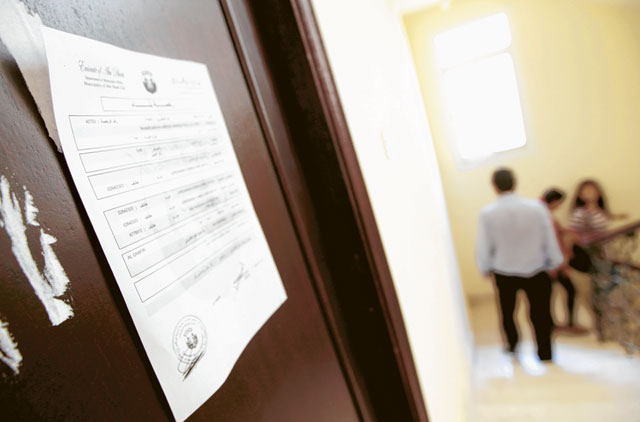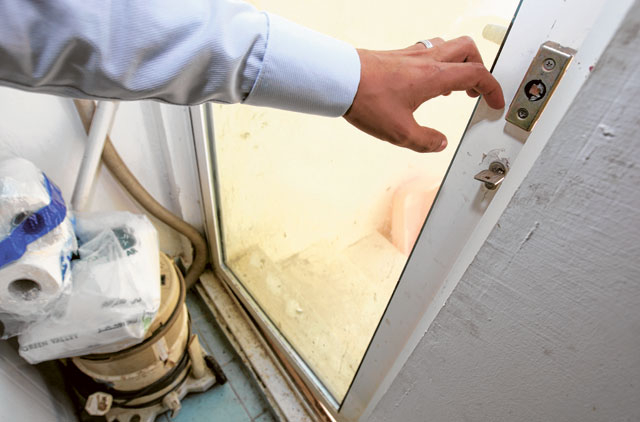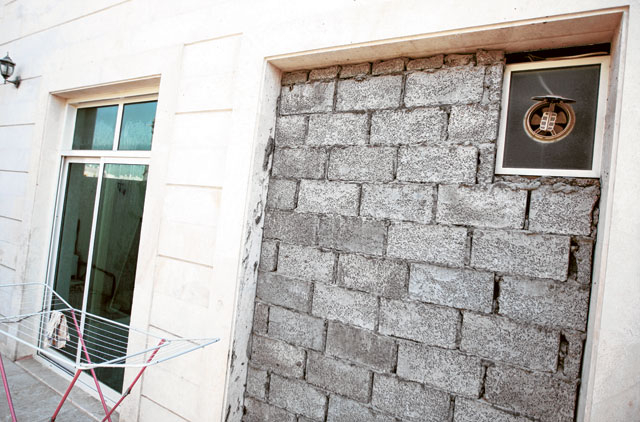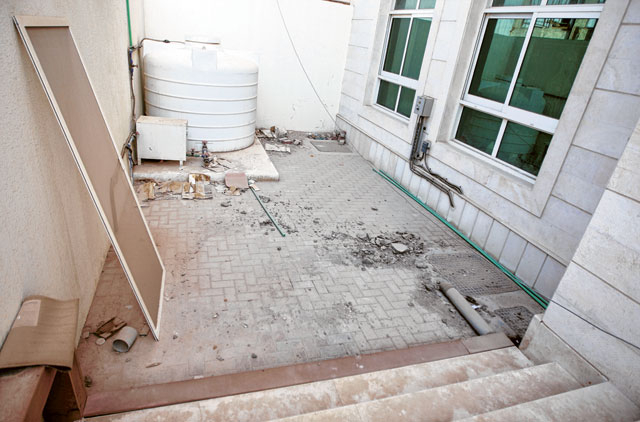
Abu Dhabi: In most locations, a villa conjures up an image of a life of luxury, private courtyards and palm-fringed gardens.
But as many residents of the capital will know, a villa in Abu Dhabi is often a very different set-up, with traditional Arabic homes divided up and rented to multiple families.
And, as Gulf News discovered, a great deal of Abu Dhabi's villa stock is not only crowded, but in poor condition. Landlords, emboldened by years of under-supply in the capital's property market, have been dividing up their properties and reaping the rewards. Tenants, meanwhile, benefit by paying less.
"For the residential market, until a couple of years, the market had been under-supplied. So by moving into a residential villa you could make more from a landlord's perspective and cut cost from a resident's perspective," explained Matthew Green, head of research and consultancy for the UAE at CB Richard Ellis Middle East.
Craig Plumb, head of research for Middle East and North Africa at Jones Lang LaSalle, added that it was difficult to get a proper understanding of the intensity of the situation since there isn't any official data on how many people live in shared residential villas.
He also pointed out that there were, on average, 1.9 families for every dwelling in Abu Dhabi, and that both apartments and houses were being divided up and leased.
"There's a lot of sharing going on," Plumb said.
Plumb added that a lot of people put up with shared apartments or villas because they simply can't afford new apartments.
"Abu Dhabi has a lot of people who are here to save money to send home. They don't want to pay a significant portion to rent a new apartment," he said.
But although the practice is popular, it is not clear how legal it is.
Regulation
In March 2011, Abu Dhabi Municipality launched a new project called Tawtheeq, which aims to register all leasable properties and lease contracts in the capital in order to compile and organise a database of Abu Dhabi real estate.
First, landlords are required to declare all the details of their property. Then, if there are no violations according to the building code, the landlord will be granted the option to issue the registered tenancy contract at his own convenience, explained Ali Al Hashemi, Tawtheeq project manager at Abu Dhabi Municipality.
So far, 45,000 plus units have been registered with the Tawtheeq programme since its launch in March.
When asked about partitioned villas, Al Hashemi said that any modifications made to the villa would have to be based on a permit granted by the Construction Permits Department at the Municipality.
"If we have a villa that is meant to be used by one family and a landlord without any permits divided the villa into several units and started leasing out independent units, by law this is not allowed and we will not issue any registered tenancy contracts," Al Hashemi said.
Al Hashemi added that the programme also keeps track of the number of tenancy contracts per property.
"If the landlord has provided me with a villa with 16 contracts, then there's a question because in my original floor plan this villa is only suitable for one family," he said.
"Our main aim is to stop these illegal structures without permits. We're not stopping people from leasing out their units, but also health and safety is a priority and we want a suitable standard of living."
When asked about what happens to those who don't come forward to register their properties, Al Hashemi said that eventually the landlord won't be able to serve their tenants without a registered tenancy contract.
"Their tenants won't be able to get a trade licence or renew it; they won't be able to connect utilities or even get a parking permit so hence that landlord will lose potential clients."
When asked about partitioned villas, Mustafa Saeed, a senior associate at Clyde & Co in Abu Dhabi said: "The question is not whether the partition is temporary or not. The question is do you have the municipality's approval to partition your villa."
There are a number of regulations that deal with the maximum number of occupants per bedroom and also the ability of bachelors to live in certain accommodation, he said.
"There are also rules about non-familial relations living together, so obviously males and females who are not related are not permitted to live together," he added.
Looking ahead
However, looking ahead, as new supply comes on the market, residents will soon start to occupy based on merit and quality of the space, Green said.
Landlords of older buildings or residential villas that are not in good condition will soon struggle because they won't be able to compete or they would be able to compete on cost only, he said.
"At that point they will have nothing to bargain with, especially since people are looking for facilities, amenities and parking," he said.
While rents are falling, Plumb said they still haven't reached the point where they're attractive for a lot of people.
According to Plumb, the cost of accommodation is also inhibiting businesses from coming into the city. "For instance, a lot of businesses are keeping people in Dubai," he said.
"There needs to be more attention paid to provide affordable housing to lower-income earners," he said, adding that there are new regulations in place requiring developers to provide affordable housing within new residential developments. "That's about 20 to 25 per cent."
Landlords need to start thinking that there is more choice in the market and people will be free to move, Green said.
"They need to start realising that and provide the level of service that will keep tenants there and build that tenant loyalty," he said.
" I think it's the ones that are pro-active that will be ahead of the market."
Many hesitate to report breach of contract
In Abu Dhabi, tenants typically pay a whole year's rent upfront or, if they're lucky, in two instalments. However, for those who have chosen to cut costs and live in cheaper shared residential villas, poor quality and zero maintenance could mean they have just paid for a full year's nightmare.
At least, that has been the case for most residents as Gulf News found out during a visit to a compound in Abu Dhabi.
One family with a five-month old baby which wished to remain anonymous has been without air conditioning since before the start of Ramadan during the hottest of summer days.
"Tomorrow, every time I call them they say they will come tomorrow," the tenant told Gulf News. The backyard door was broken and there was a leakage problem in the bathroom, too.
However, for these tenants and their neighbours, their biggest fear owed itself to the municipality notices that had been hung on their doors twice since they moved in informing them of illegal modifications in their homes and requesting them to vacate the place by the end of June.
For one family, the bathroom and the kitchen were two illegal additions.
But the end of June came and nothing happened, the residents said. "They seem to have done something with the municipality and managed to get away with it," one resident told Gulf News.
A.M., who lives in a studio with his wife, was supposed to move into his place on February 1 as per his tenancy contract, but eventually moved in on the 15th because his apartment was not ready, he said. Now, he can't wait to move out. "I'm actually leaving a month before my contract runs out."
Legal recourse
Despite several trials, Gulf News could not reach the management company of the villas for comment.
Abdul Aziz Zurub, director of health, safety and environment (HSE) division at the Abu Dhabi Municipality urged residents to take legal action.
"Why haven't they called 800555? There is a system in place for such complaints and once a complaint is filed it will be taken up with the appropriate government entity," he said.
Zurub told Gulf News that the civic body had disconnected electricity to 20 residences in the past few months because of illegal additions.
While inspectors with the Municipal Service Centres are constantly on patrol, he said they can only file a complaint about what looks illegal on the outside. However, they can't go into people's homes for random inspections without an official permit, he said.
Zurub said that there's no doubt that a lot of landlords are breaking the law, which is why the Municipality is currently working on linking the maintenance of buildings with the Tawtheeq programme.
What this means is that registered tenancy contracts would go hand-in-hand with regular maintenance inspections, he explained.
A new law that controls the number of occupants per residence is also expected to be issued very soon, he added.
Zurub believes it is going to take time for the market to get organised.
"But in the meantime, those who know of violations should come forward."
Rules: What you should know as a tenant
Before your lease runs out, you have to give notice to your landlord that you no longer wish to renew the lease and if you don't give that notice then the lease automatically renews.
If the lease comes to an end and the tenant wants to stay on then the landlord is obliged to accept the renewal of the lease provided that he can increase the rent by up to five per cent.
Under the landlord and tenant law, landlords have an obligation to maintain their property for the tenants' benefit other than minor works which is customary for the tenant to do.
Under the landlord and tenant law, you are entitled to request the landlord to complete the necessary work if the property is not being maintained. You are entitled to apply to the Tenancy Dispute Settlement Committee to carry out the work yourself and recover the cost from the rent.
"Under the law, a tenant is required to obtain the landlord's consent to any sublease. In addition, where there is partitioning of a villa or apartment, this will require the municipality's approval."
Source: Mustafa Saeed, Senior Associate at Clyde & Co.















